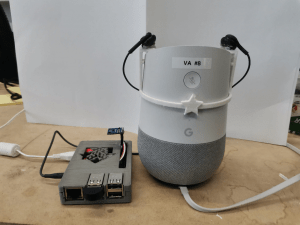
Left: Raspberry Pi prototype; Right: Commercial smart speaker.
This project aims to develop proactive conversational agents based on smart speakers. Existing smart speakers mostly function as passive virtual personal assistants that need to be activated by special voice commands (e.g., ’Hey Google’ for activating Google Home) before recognising and responding to people’s commands. They cannot proactively engage users by initiating conversations, which limits the range of application scenarios. For example, proactivity would benefit the implementation of intervention systems for chronic disease management.
We have developed a proactive speaker prototype based on Google Home. This prototype can proactively ask users questions and sense ambient contextual data. Our goal is to model and predict users’ availability for having conversations with proactive speakers. Additionally, we are also investigating the appropriate way for proactive speakers to initiate conversations with users.
In the future, applications such as the chronic disease management system can be deployed on proactive speaker systems. Previous studies have demonstrated that self-management systems face challenges in user engagement and maintenance. Proactive speakers are interactive and have the potential to deliver just-in-time personalised messages or interventions through conversations to provide more engaging and optimal support to patients.